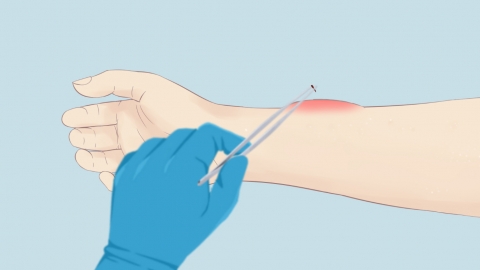What to do if stung by a wasp
After being stung by a wasp, localized symptoms such as redness, swelling, pain, and itching may occur. It is important to promptly and effectively treat the wound. Common treatment methods generally include quickly moving away from the swarm, removing the stinger, cleaning the wound, applying cold compresses, and using topical medications. Detailed steps are as follows:

1. Quickly move away from the swarm: After being stung by a wasp, immediately move away quickly to a safe location to avoid being stung again.
2. Remove the stinger: After being stung, the wasp's stinger may remain embedded in the skin and should be removed promptly. It can be gently scraped off with a fingernail or a flat-edged instrument. Do not squeeze or pinch the stinger with your fingers, as this may cause more venom to be released into the body.
3. Clean the wound: Wash the affected area continuously with warm water and soap or running clean water, which helps remove bacteria around the wound and prevent infection. Additionally, since wasp venom is alkaline, acidic substances such as vinegar, white vinegar, or lemon juice can be applied locally to help neutralize the toxin.
4. Apply a cold compress: After being stung by a wasp, apply an ice pack or a cold, wet towel to the affected area, which can help relieve pain and swelling and slow the spread of venom. Cold compresses can be repeated multiple times.
5. Apply topical medications: After cleaning the wound, topical medications may be used as directed by a physician, such as erythromycin ointment or calamine lotion, to reduce inflammation and relieve pain. If the pain is severe or an allergic reaction occurs, anti-allergy medications such as cetirizine hydrochloride capsules or desloratadine oral solution, anti-inflammatory drugs such as penicillin V potassium tablets or cefixime granules, or pain relievers such as ibuprofen suspension or tramadol effervescent granules may be used as directed by a physician.
If symptoms persist after the sting or severe allergic reactions occur, such as difficulty breathing, dizziness, or widespread rash, seek immediate medical attention at a hospital for intravenous therapy or other professional treatment under a doctor's guidance.








